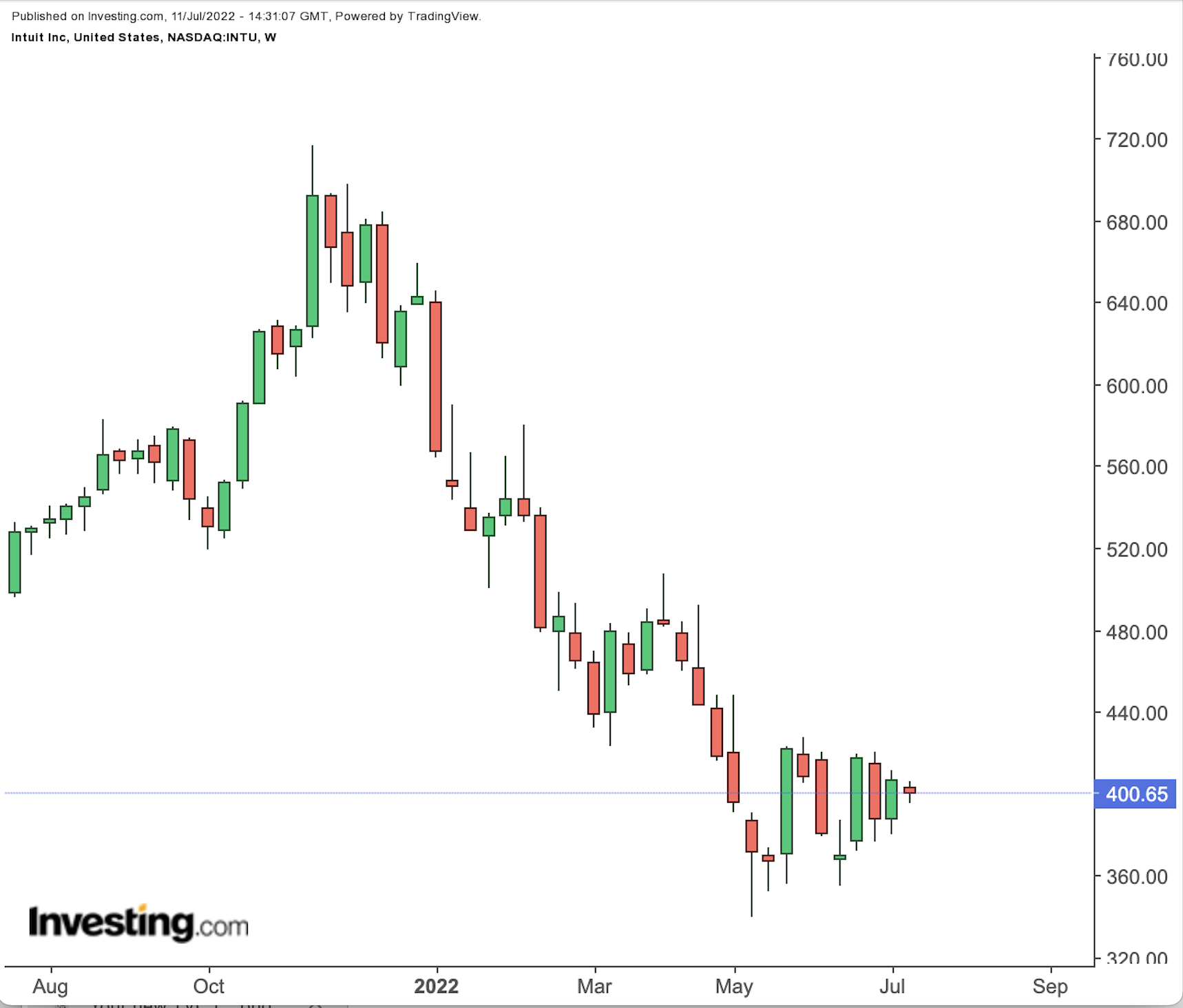SoFi stock falls after announcing $1.5B public offering of common stock
- Intuit stock has plunged 43% from November highs — an unwarranted decline
- The long-term story is attractive, with management promising substantial growth
- But INTU still trades at 35x this year's earnings, which may keep a short-term lid on shares
On Nov. 18, Intuit (NASDAQ:INTU) reported first quarter earnings and raised its full-year guidance. The following day, INTU stock traded as high as $716 and closed up 10%.
Since then, INTU has headed in the wrong direction. Shares only closed higher on one day, in late November. From intraday highs on Nov 19, Intuit stock now has declined 43%.

Source: Investing.com
On its face, the decline doesn't seem logical. But looking at the stock with fresh eyes — as investors must do in this market — the new, lower valuation makes more sense. INTU certainly is cheaper — but it's far from cheap.
Eight months ago, investors were willing to pay almost any price for quality; right now, they're focusing on valuation. When that pendulum reverses — as it inevitably will — there's a case for INTU to resume its long, impressive upward climb. Until then, however, the sell-off may well continue.
Why Has Intuit Stock Fallen?
Again, the steep decline from last year's highs doesn't seem to make a lot of sense. Obviously, broad markets have fallen sharply. But since Nov. 18, the NASDAQ 100 has declined 26% and the S&P 500 17%. Intuit — a member of both indices — has underperformed.
In theory, INTU should outperform. The core TurboTax business is relatively defensive: tax returns don't stop in a recession. In fiscal 2021, the Consumer and ProConnect (the former of which includes TurboTax; the latter of which serves professional tax preparers) segments accounted for nearly half of profits.
Certainly, via QuickBooks, there's exposure to small businesses that may struggle in a recession, but that segment also includes self-employed individuals who may be able to weather a financial storm. Overall, Intuit should manage a macro downturn better than most other major companies.
Intuit's balance sheet also matters. The company has zero debt. In fact, it has about $13 per share in cash. That profile should minimize stock losses in a market downturn: financial leverage amplifies returns on both the way up and the way down.
From the perspective of the decline of the last eight months, the sell-off looks like an overreaction — and the INTU stock price an opportunity.
Valuation Matters Again
The problem with that analysis is that it ignores one key fact: valuation, both at the highs and at the moment.
Intuit did raise guidance after Q1. Its updated forecast for adjusted earnings per share came in at $11.48 to $11.64. Even at the high end, at the intraday high on Nov. 19 Intuit stock traded at a whopping 61x earnings.
Sixty-one times earnings is a massive multiple for a mature business, no matter how high-quality. And it's a multiple that no doubt was driven at least in part by low interest rates. Intuit (perhaps somewhat ironically, given performance since) was seen as a relatively safe business because of its tax business and its impressive history of organic and inorganic growth.
At the time, investors couldn't get much yield in lower-risk debt, and so INTU could serve as a potential substitute while adding strong growth potential as well.
The problem for INTU stock now is twofold.
First, at least in retrospect, the 61x multiple seems almost ludicrous. Indeed, investors even at the time seemed to realize that: shares faded from those highs relatively quickly, dropping about 10% by year-end and falling further even before broad markets rolled over early this year.
The second is that even now, the stock still trades at 34x this year's guidance (which has been raised modestly since). Looking to next year, INTU is valued at 29x earnings. Among the more than 90 companies with a market capitalization over $100 billion, only five have a higher forward P/E multiple.
To be sure, INTU has stronger growth prospects than most of those companies. But there is some cyclical risk here, whether in lower revenue from SMBs (small and medium-sized businesses) or in consumer filers downgrading to free versions. Even the crypto boom/bubble helped Intuit: management has estimated that some 4 million filers had crypto transactions, which added complexity and likely boosted upselling.
Again, Intuit stock is cheaper but hardly cheap.
The Long-Term Case For INTU Stock
All told, the sell-off here does make some sense. Valuation last year no doubt was stretched. There are cyclical risks. It's hardly ridiculous that INTU has underperformed.
At the same time, there is a case that this sell-off indeed is an opportunity when taking the long view. Intuit has established what it calls “bold goals” for fiscal 2025, including improving the success rate of its business clients by more than 10 percentage points and doubling its customer base to more than 200 million.
There's room to expand overseas by growing the tax business in Canada and the SMB operations in English-speaking countries, including the U.K. The acquisitions of Mailchimp and Credit Karma are part of a broader strategy to make Intuit a “one-stop shop” for financial management for both businesses and consumers.
Double the user base and increase per-user spending, and revenue grows more than 100%. The platform nature of the business suggests even stronger profit growth. Intuit almost certainly doesn't triple earnings by fiscal 2025, but there's a path to do so over a multi-year period. And even if the earnings multiple for INTU stock shrinks (owing to a smaller opportunity looking forward), the stock likely still returns more than 10% on an annualized basis over that stretch.
To be sure, that's perhaps not the hugely compelling opportunity a 43% decline might suggest, which speaks to how stretched valuation here remains. But given that Intuit almost certainly can drive some growth even through a recession — revenue increased 4% in fiscal 2009, which straddled the worst of the financial crisis — the risk/reward here at least looks positive.
At some point, investor attention will return to that fact. And if another leg down in the broad market makes INTU stock cheaper in the meantime, all the better.
***
Interested in finding your next great idea? InvestingPro+ gives you the chance to screen through 135K+ stocks to find the fastest growing or most undervalued stocks in the world, with professional data, tools, and insights. Learn More »
